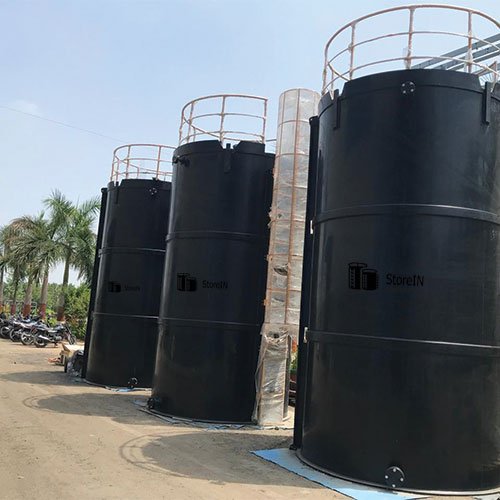HDPE Storage Tank
Introduction to HDPE Storage Tanks
In an ever-evolving industrial landscape, the need for reliable, safe, and efficient storage solutions has never been more critical. Enter the HDPE Storage Tank — a quintessential component designed to meet the stringent demands of modern industries. Crafted from high-density polyethylene (HDPE), these tanks are engineered to provide an unparalleled combination of durability, lightweight construction, and chemical resistance, making them the ideal choice for storing a wide array of chemicals, liquids, and hazardous materials.
What is HDPE?
High-density polyethylene (HDPE) is a thermoplastic polymer known for its strength and resilience. Its molecular structure provides a robust barrier against various environmental factors, ensuring that the contents of the tank remain secure and unaffected by external elements. HDPE is not only lightweight, which simplifies transportation and installation, but it also boasts remarkable resistance to chemicals, corrosion, and impact. This makes HDPE storage tanks suitable for a diverse range of applications across numerous industries, including chemical processing, agriculture, food and beverage, pharmaceuticals, and wastewater management.
Weatherproof and Chemical-Resistant – PP Storage Tanks for Every Industry
Key Features and Benefits of HDPE Storage Tanks
Chemical Resistance: One of the standout features of HDPE storage tanks is their exceptional resistance to a wide variety of chemicals. Whether you are storing acids, bases, or other corrosive substances, HDPE tanks provide a reliable solution that minimizes the risk of leaks and contamination.
Corrosion Resistance: Unlike traditional metal tanks, which can rust and corrode over time, HDPE storage tanks are impervious to corrosion. This longevity not only extends the life of the tank but also reduces maintenance costs and downtime.
Lightweight and Portable: The lightweight nature of HDPE allows for easier handling and installation. This portability is particularly beneficial for industries that require frequent relocation of storage tanks or those that operate in remote areas.
Impact Resistance: HDPE tanks are designed to withstand physical impacts, making them ideal for environments where accidental collisions or drops may occur. This durability ensures that your stored materials are protected, providing peace of mind.
UV Stabilization: For outdoor applications, UV stabilization is a crucial feature of HDPE storage tanks. This treatment protects the tank from sun damage, ensuring that it maintains its structural integrity and performance over time.
Customizable Designs: HDPE storage tanks can be tailored to meet specific requirements, including size, shape, and configuration. This versatility allows businesses to optimize their storage solutions based on their unique operational needs.
Environmentally Friendly: HDPE is a recyclable material, making these storage tanks an environmentally responsible choice. By opting for HDPE, companies can reduce their environmental footprint and contribute to sustainable practices.
Cost-Effectiveness: With their long lifespan and minimal maintenance requirements, HDPE storage tanks represent a cost-effective investment for businesses. The reduced risk of leaks and spills further enhances their economic viability.
Applications of HDPE Storage Tanks
The versatility of HDPE storage tanks makes them suitable for a wide range of applications across various industries:
- Chemical Storage: Ideal for storing hazardous chemicals, including acids, bases, and solvents, HDPE tanks provide a safe and secure solution for chemical manufacturers and distributors.
- Water and Wastewater Management: In municipal and industrial settings, HDPE tanks are used for storing and treating water and wastewater, ensuring compliance with environmental regulations.
- Agriculture: Farmers and agricultural businesses utilize HDPE storage tanks for storing fertilizers, pesticides, and other agricultural chemicals, ensuring safe and efficient application.
- Food and Beverage Industry: HDPE tanks are suitable for storing food-grade liquids, including oils, syrups, and other consumables, meeting the stringent safety standards of the food industry.
- Pharmaceuticals: In the pharmaceutical sector, HDPE storage tanks are used to store active ingredients and other sensitive materials, ensuring product integrity and compliance with health regulations.
Installation and Maintenance
Installing an HDPE storage tank requires careful planning and consideration. It is essential to assess the site conditions, including soil type, drainage, and accessibility, to ensure a successful installation. Professional installation services are recommended to guarantee that the tank is securely anchored and properly connected to any necessary plumbing or electrical systems.
Once installed, HDPE storage tanks require minimal maintenance. Regular inspections should be conducted to check for signs of wear or damage, and the tank should be cleaned periodically to prevent the buildup of contaminants. With proper care, your HDPE storage tank can provide reliable service for many years.
Conclusion
In conclusion, the HDPE storage tank is an indispensable asset for any business that requires a safe, durable, and efficient solution for storing chemicals, liquids, and hazardous materials. With their impressive array of features and benefits, including chemical and corrosion resistance, lightweight construction, and customizable designs, HDPE storage tanks are poised to meet the demands of a wide range of industries.
Investing in an HDPE storage tank is not just a practical decision; it is a commitment to safety, efficiency, and sustainability. Whether you are in the chemical, agricultural, food and beverage, or pharmaceutical industry, the HDPE storage tank stands ready to support your operational needs while protecting the environment and your bottom line.








